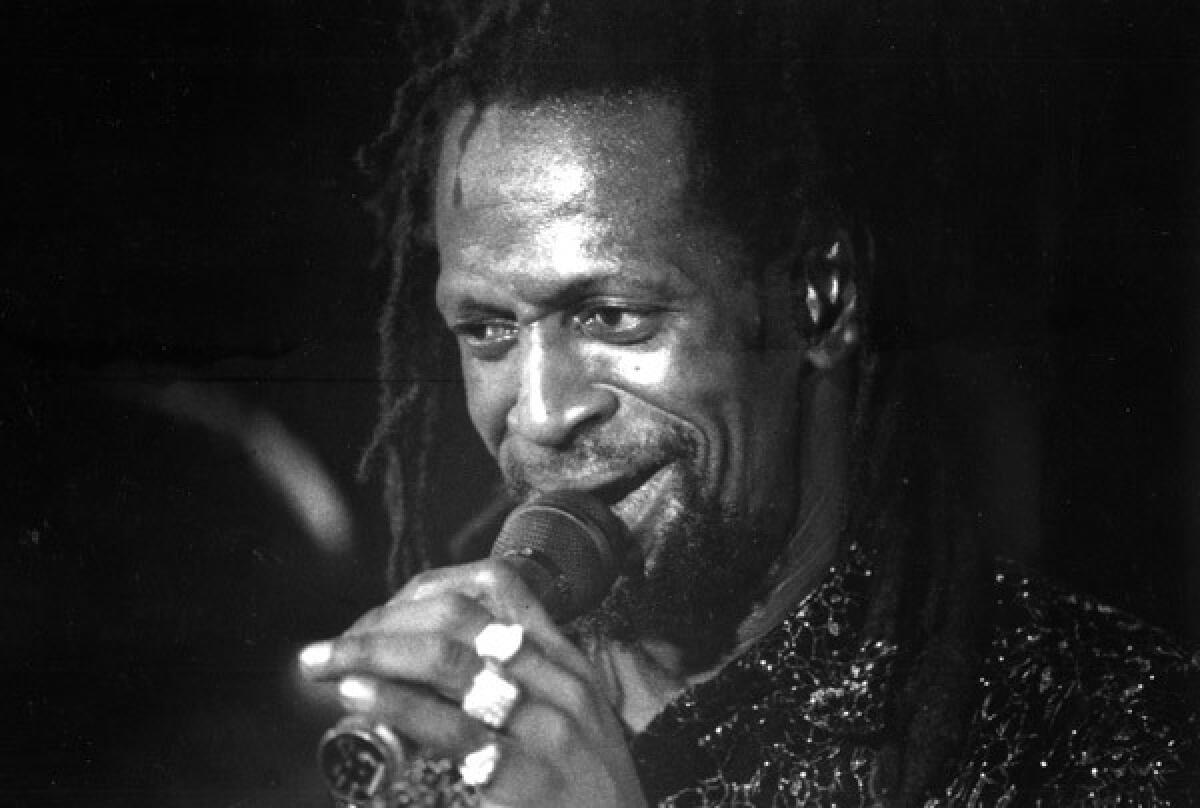Gregory Isaacs dies at 59; Jamaican singer pioneered reggae style known as lovers rock

- Share via
Gregory Isaacs, the Jamaican singer who pioneered the style of reggae music known as lovers rock and became one of the genre’s major stars in the 1970s, has died. He was 59.
Isaacs died Monday at his home in London, according to his manager, Copeland Forbes. He had been diagnosed with lung cancer last year.
Known as the “Cool Ruler,” as he styled himself in the title of a 1978 album, Isaacs cut a dapper figure in his designer suits and silk shirts — an image suited to a style of music that emphasized romantic yearning over reggae’s more traditional themes of spiritual and political transformation.
“I’d say he’s one of the three geniuses I’ve known in the reggae music business, and I’ve known everyone,” said Gary Himelfarb, who recorded several Isaacs albums for his Washington, D.C.-based RAS Records label in the 1990s.
“Gregory was the kind of person who could walk through a room of 20 people and come out the other side and tell you what everybody was wearing,” added Himelfarb, whose professional name is Doctor Dread. “He could sit at a piano and compose incredible tunes. He was really brilliant. He was on a whole other level than your typical Jamaican artist.”
Isaacs also cultivated an outlaw persona — a “rude boy” in Jamaican slang. He had frequent run-ins with the authorities (he once estimated his number of arrests, mostly on drug- and gun-related charges, at around 50) and suffered from a serious cocaine addiction.
Those tendencies might have held him back from even greater achievements, especially in the U.S. In 1982, shortly after the death of reggae’s iconic leader, Bob Marley, New York Times critic Robert Palmer wrote that Isaacs “could be reggae’s most likely candidate for stardom in the United States.”
That was the year of his biggest hit, the playfully suggestive “Night Nurse,” but instead of capitalizing on its success, Isaacs spent six months in jail in Kingston, Jamaica. His drug habit contributed to his notorious unreliability and the eventual deterioration of his supple voice, but in recent years he said that he had brought it under control, and reports on some 2009 performances were highly positive.
“Drugs are a debasing weapon,” he said in a 2007 interview with London’s Daily Telegraph. “It was the greatest college ever, but the most expensive school fee ever paid — the Cocaine High School. I learnt everything, and now I’ve put it on the side.”
Isaacs was born in Kingston on July 15, 1951, and grew up in Denham Town, a poor section of the Jamaican capital. In school, he enjoyed reading, composition and painting, and at home he listened to American R&B on his family’s rented radio.
He was drawn to the soulful, romantic sounds of Sam Cooke and the Drifters, and as a teenager he began performing in Kingston’s talent competitions. He made his first records in the late 1960s, then sang with the Motown-flavored vocal group the Concords before going solo. He started a record label and store, African Museum, in 1973 and soon hit his stride.
Isaacs’ polished reggae sound was a sleek vehicle, and his lyrics focused on romantic pleas and tales of love, both fulfilled and frustrated. His high voice had an effortless, understated ease and he punctuated his vocals with disarming moans and groans that became his signature.
He was soon a major record seller in Jamaica, and then in Britain, with such hits as “All I Have Is Love,” “My Only Lover” and “Slave Master” (the last from the 1978 movie “Rockers,” in which he played a street thug.) The commercial success of his lovers rock established the sound as a dominant force in reggae.
“Not only in Jamaica but also in England, where he was a major star, an awful lot of the artists in the ‘80s and ‘90s chose that form of reggae,” author and reggae scholar Roger Steffens said in a recent interview, citing Isaacs’ considerable influence. “Frankie Paul, Sugar Minott and a host of younger artists who basically made love songs for the dance hall.”
“I don’t know if I invented it, but I popularized it,” Isaacs said of the lovers-rock style in a 1986 interview with the Toronto Star. “Since I was growing up, I liked love songs — Smokey Robinson, Sam Cooke. That was the kind of songs getting the girls dancing.”
Though he was identified with lovers rock, Isaacs often moved into social commentary in his music, in such songs as “Border” and “Black Liberation Struggle” — a combination that led some to liken the singer to American R&B master Marvin Gaye.
Isaacs was a prolific record-maker, though he disputed published claims that he had released about 500 albums — he figured it was closer to 200. He recorded for a variety of Jamaican labels and three major British companies: Virgin, Island and Charisma.
He had a knack for collaborating with top-flight Jamaican musicians, including the producing team Sly and Robbie and the groups the Heptones and Roots Radics. He also teamed with Dennis Brown, another lovers-rock luminary.
“He had a very long run as a major figure,” Steffens said. “A unique voice. He was highly respected in the music community, and popular all over the world.”
Survivors include his wife, Linda.
Cromelin is a former Times staff writer.
More to Read
Start your day right
Sign up for Essential California for the L.A. Times biggest news, features and recommendations in your inbox six days a week.
You may occasionally receive promotional content from the Los Angeles Times.






